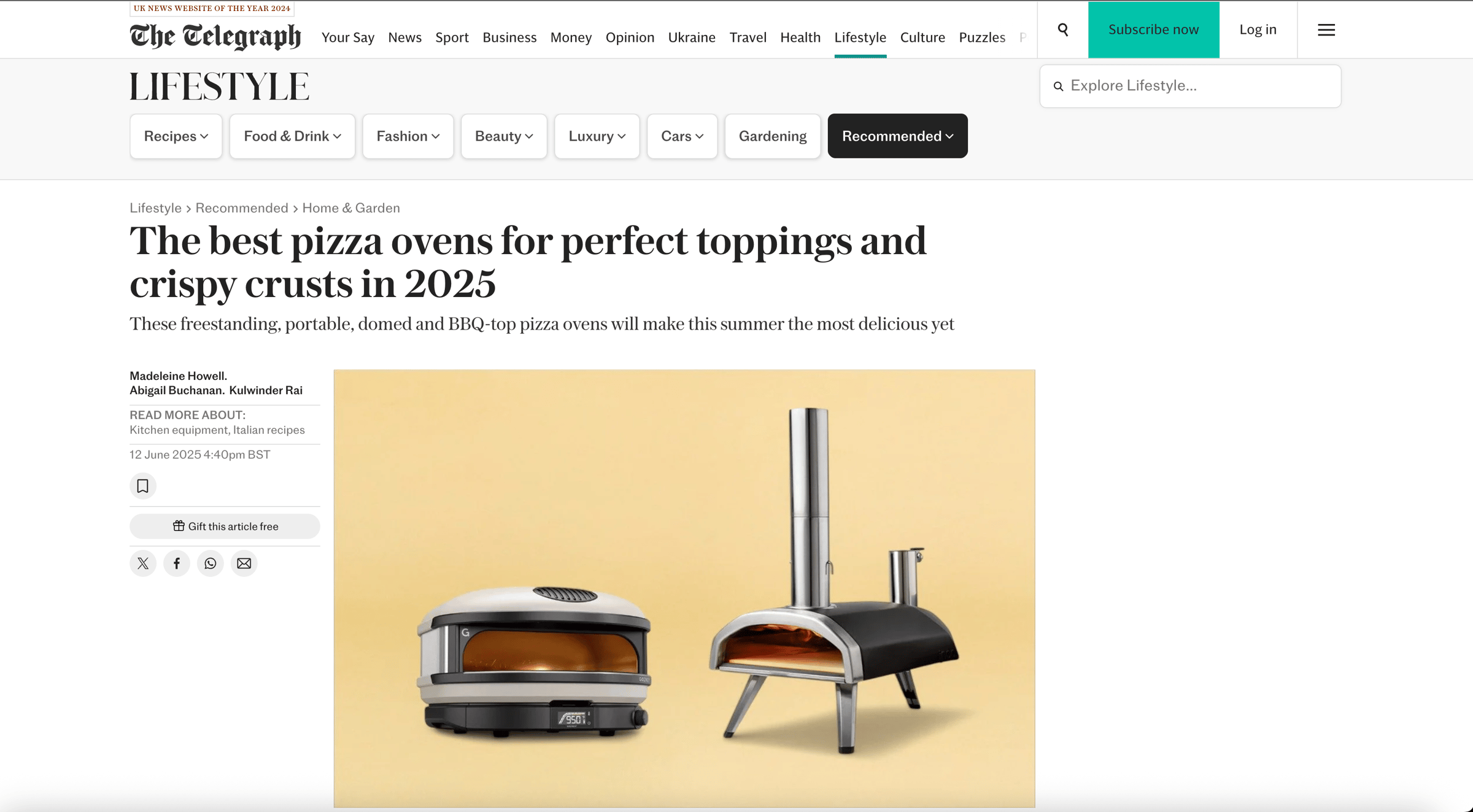
Over the next year, I predict that we’re going to see some pretty significant changes in the digital PR industry.
But these are welcomed and, in my opinion, long overdue.
We’ve already started to see AI-powered search become the hot topic within marketing teams, and you’d be hard pushed to find a brand that isn’t seeing some level of ‘the crocodile effect’ in Google Search Console … impressions up and clicks down:

Since AI Overviews launched, clicks have been dropping for many sites, even when they themselves are included as a source. Let’s just agree that AIOs aren’t really set up to drive clicks, despite Google saying those that do are a higher quality.
These are typically only being triggered for informational queries, and Google’s saying that those clicks that are happening are higher quality. That’s still up for debate, and time will tell.
And then there’s Google’s AI Mode. It’s all taking away clicks from traditional search to some degree.
But forgetting Google for a moment, there’s no ignoring that traffic to other AI-powered search platforms are growing in usage at a rapid pace. And in April, ChatGPT added a shopping experience which is a sign that we’re moving in the direction of these tools being used as an alternative to search engines to find recommendations for businesses.
Whether we like it or not, AI is changing how people search.
And whilst there’s been lots of talk about how SEO in a wider sense is changing, and will change over the coming months, there’s not been too much talk about how digital PR is going to change.
I’ve written about the role of digital PR in being recommended by AI-powered search, as have others.
There’s no getting away from the fact that digital PR has just become even more important than it was before, due to how key it is to influencing visibility in ChatGPT, AI Overviews and other AI-powered search platforms.
It’s something that the brands already investing in should be doubling down on, and those who aren’t currently doing so need to kick off. Those that don’t will be left behind.
But there’s going to need to be changes that happen in order for digital PR to have the biggest possible impact on visibility in AI search.
Some of these things should have already happened across the industry. Some have been adopted by some agencies for a while now. But in this new era of search, those who don’t change things up will get left behind.
Here are my predictions on what changes I think (hope) will happen over the coming months around digital PR.
1. Digital PR strategies will break down into two key tracks of work, each with different goals
You can’t (shouldn’t) just stop what you’ve been doing to drive growth on the traditional SERPs and pivot to what works for AI search visibility.
That’d be crazy.
Traditional search still makes up the bulk of organic traffic for most sites, and this means you need to both protect, and grow, this.
But you also don’t want to be left behind without being visible in AI-powered search.
Add in the fact that it’s mentions that matter most for visibility on these platforms and it’s easy to see why it’s not as simple as having a single ‘digital PR strategy’ that hits every goal.
So on this, I’m predicting we’re going to see the smartest brands start to run two tracks of digital PR work; both which roll up into one broader digital PR strategy.
👉 Digital PR to influence traditional search
👉 Digital PR to influence AI-powered search
These two roll up into building brand… which ultimately, all digital PR should be set up to do.
It’s absolutely not the case that digital PR is just about search, because it’s not. At the top, it’s a brand channel … it just so happens that it’s pretty darn critical to increasing search visibility.
You can’t just ‘do digital PR’ and expect it to show the best results, though. You’ve got to be strategic and do what’s going to have an impact.
As an example…
Tracked affiliate links don’t contribute to increases in traditional search visibility (at least not due to the links), whereas these do (when earned from the right sources) influence visibility in AI search.
There’s some digital PR tactics which lend themselves more to increasing search visibility, others AI visibility. They’re all things that need to be done, they just need different goals … and that means two different tracks of work to keep the focus.
It’s a flywheel, though.
Digital PR influences traditional search rankings which, in turn, influence AI-powered recommendations. At least, when the AI is running a web search (when it’s not, you need to be mentioned in the training data) and you want your own site’s content to be cited. It’s not all about third party mentions, you want that traffic to your own site. You need to keep that flywheel spinning, and you can’t do that just by focusing on the things that drive AI visibility.
I predict that lots of brands will pull back on digital PR for traditional search to chase AI visibility. But given it’s a flywheel, this might not be the smartest move.
In the coming months, we’ll see brands focusing on two tracks of work, each against its own goals but which all rolls up into brand building. And I’m all for this.
2. KPIs and the way which digital PR success is measured will change and evolve
We can’t keep measuring the success of digital PR by the number of links earned.
I mean, we never should have done, but it makes even less sense now than ever before.
The way we measure the success of digital PR has to change, and I predict that the focus on earning visibility in AI platforms will be what finally makes this happen.
(And this is without even mentioning the fact that KPI as a terminology has been used incorrectly in digital PR for years … a KPI is a ‘key performance indicator,’ not a guaranteed number of links or pieces of coverage … but hey, let’s talk about that another day)
I predict we’re going to start to see the impact of digital PR measured in better, and new, ways in the coming months. Things like:
- Impact on revenue
- Impact on AI visibility
- Impact on traditional search visibility
These things all come with their own KPIs, and digital PR contributes to moving each of them in the right direction, but I have a feeling we’ll very soon have less conversations about ‘the number of links’ and ‘the cost per link’ and more about the outcomes that PR drives for a business.
Again, I’m all for this.
3. We’ll see an even greater focus placed on earning hyper relevant coverage
Digital PR should have always been about earning relevant coverage, but sadly that’s not always been the case.
But the move towards AI-powered search is what’s going to finally make this a total non-negotiable.
There’s more evidence than ever that Google is ignoring irrelevant links, but now that we can see the sources that LLMs cite when making recommendations, the easier it’s going to be to steer the direction of how relevant press coverage needs to be.
And this is another way that digital PR for traditional search and digital PR for AI-powered search are going to look a little different.
For example, if you want to be recommended by ChatGPT when someone asks for ‘the best pizza oven,’ you’re going to need to be cited within product roundups of ‘the best pizza ovens.’
Just like this:

Whereas, the links earned from pitching out tips for cleaning your pizza oven will likely help you rank on traditional search.
There’s going to be more of a need than ever to land press coverage within specific stories about the exact topics you want to be cited in, and this takes the concept of relevance to a whole new level.
4. We’ll see more first party data used in PR stories and a better use of insights from in-house subject matter experts
There’s two reasons why I think we’re going to see more of a move to brands leveraging their own first-party data and insights provided by in-house subject matter experts over the next year…
The first of these is a need to stand out from the crowd and feed in something that journalists can’t easily do themselves. A simple analysis of government data, for example? This once took time, but is now quick and easy to do with ChatGPT. And this means journalists’ wants have changed, too.
If we consider what AI absolutely can’t do, it can’t produce proprietary first-party data or come up with new insights and opinions … the things that exist in subject matter experts’ heads.
The other is information gain.
Whilst this is closely linked to the first point, this is going to become even more important in the new era of search.
If you want to be cited by LLMs and AI-powered search, as well as traditional search, you need to create content that doesn’t just reword everything else that’s out there. You need to add something new to the topic… that’s what information gain is.
Both insights from experts and first-party data do exactly that. It’s things that are unique to you, and therefore which can be used to add insane value to a topic.
5. Affiliate marketing will partly sit within the remit of digital PR teams
When digital PR comes out of the SEO team’s budget (which it often has done, in the past), it’s only natural that there’s very rarely a proactive attempt at securing coverage which uses affiliate links.
At the end of the day, this revenue would get attributed to the affiliate channel, not SEO.
But times are changing.
I’ve already mentioned how digital PR teams are going to need to proactively pitch for inclusion in product roundups on key publications more than ever (I mean, they should already have been doing… we’ve been including this as part of our strategies for years), at least if they want to be recommended in AI search. But the challenge that’s often faced is that these are pretty much exclusively using affiliate links.
In other words; if you don’t have an attractive affiliate scheme, you’re not getting included.
It’s a vicious circle. If you’re not included, you’re unlikely to be recommended by AI search.
I see this playing out by digital PR teams being given a wider remit that gives them at least some oversight of affiliates as a channel. Not the day-to-day running of the scheme, but in leveraging different affiliate deals to secure inclusion in product roundups.
The publications want to monetise in other ways as ad revenues drop, and affiliate commissions are the primary reason many are publishing so many product roundups.
Being able to negotiate placements in these listicles with affiliate deals is likely going to fall to PRs in the near future. And let’s address the elephant in the room … no, this isn’t going to negatively impact traditional search. It’s not link buying, at all. These links typically have no impact on SEO, anyway due to how they redirect.
But very soon, I have a strong feeling PRs are going to have affiliate deals more at their disposal to secure placements.
6. Digital PR, as a channel, will start to be owned by wider brand and marketing teams
Over the last few years, digital PR investment has typically (but not always) come out of the SEO team’s budgets.
And this is one reason why there’s been such a focus on measuring success by link count (or, more preferably, the impact on SEO success).
But only looking at digital PR as a link building tactic is ignoring the other benefits that the channel can drive … referral traffic, brand awareness, sales and more.
We’re also at an inflection point where, in many cases, there’s becoming more of a crossover between ‘traditional’ and ‘digital’ PR teams. Yet I strongly believe that the digital PRs are going to be the ones who are better placed to lead brands through this new era … they’ve got an ability to tell great brand stories, whilst also setting activity up to influence search (and AI search) success, and more.
The natural evolution here is that digital PR begins to sit under the ownership of brand or marketing teams; with links and mentions that contribute to increased search visibility being one of the outputs of the channel, rather than the single goal.
This likely means digital PRs branching out more into running stories around things like store openings, but this is a good thing (at Digitaloft, we’ve been doing this for our clients for a number of years now…).
Change doesn’t have to be bad, and the ownership of digital PR moving out of the SEO team and sitting with wider brand and marketing teams is going to be a positive thing. So long as there’s collaboration, it won’t impact SEO in a negative way, but it’ll open up a whole host of new opportunities to do things that build the brand.
7. UGC engagement will crossover with digital PR
It’s not new news that appearing in discussions on platforms like Reddit and Quora are important for long-term brand growth.
On one hand, there’s the fact that these discussions rank so prominently on Google. On the other, they’re being cited as sources by AI-powered search platforms.
Can you afford not to be talked about here?
To some degree, doing great brand marketing (and having a great product) that gets people talking is the ultimate way to achieve this, but that’s hard to influence sometimes.
But I see a future where digital PR teams are taking more involvement in working alongside subject matter experts and spokespeople to build their own personal brands on these platforms.
That tip or piece of advice you just pitched out to the press? It’s probably a talking point that can add value to a recent discussion on Reddit.
I believe we’re going to see lots of opportunities to repurpose the activity that’s being run as PR stories to add value on these UGC platforms … with a lot of this coming back to multi-modal brand building.
The Future of Digital PR in the AI Search Era
AI-powered search is already reshaping how people discover and interact with brands, and digital PR must evolve to keep pace.
The days of chasing link counts as the only success metric are behind us.
Instead, we’re entering a new era where digital PR strategies must work across two distinct tracks: influencing traditional search and influencing AI-driven recommendations.
The most forward-thinking brands will embrace this dual-track approach, rethink how they measure success, and double down on relevance, originality, and brand-led storytelling.
From owning affiliate placement strategy to driving brand visibility on UGC platforms like Reddit, digital PR is set to become more integrated, more strategic, and more essential than ever before.
Change is coming; and those who adapt first will win.



